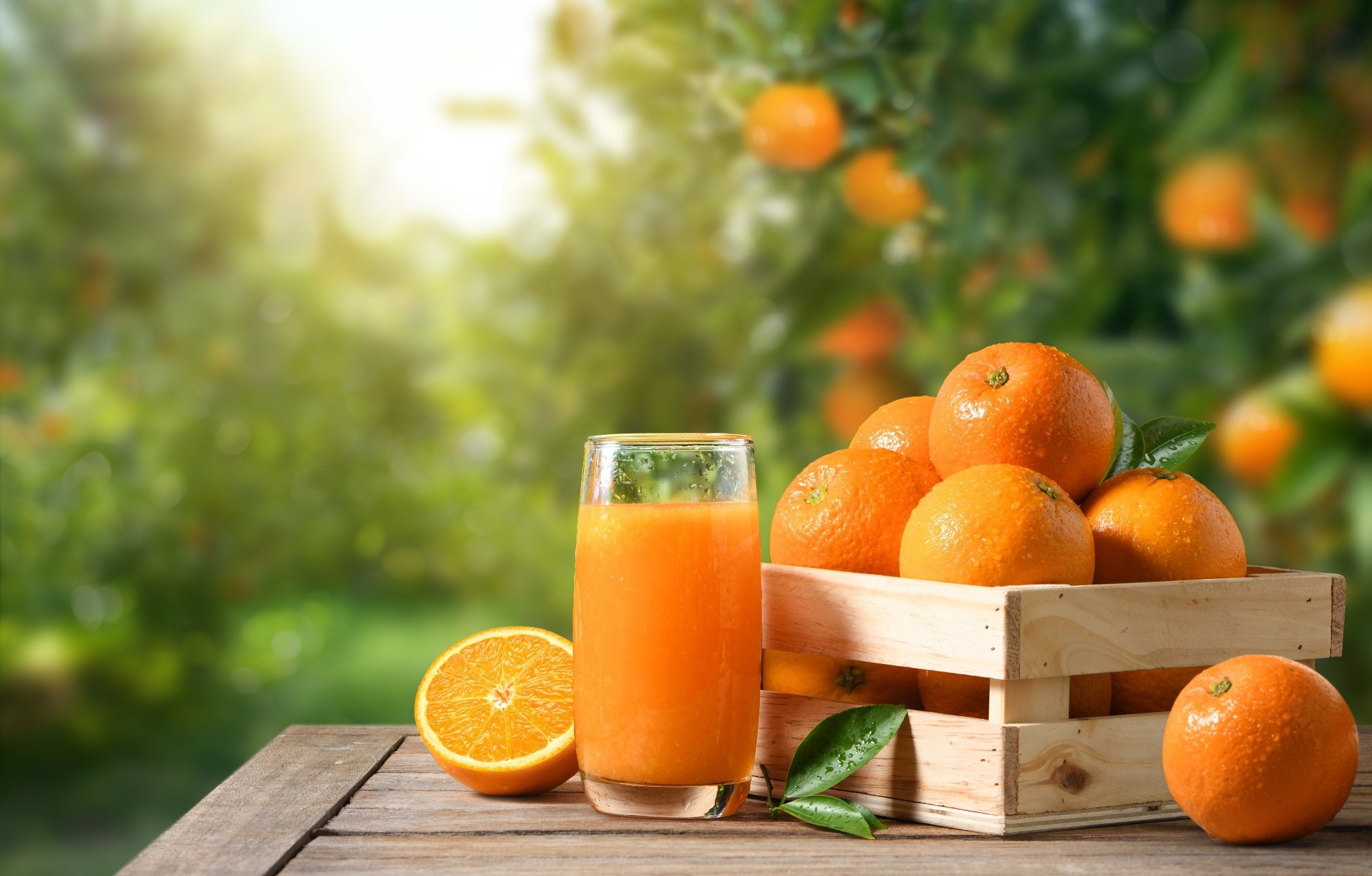Additionally, they evaluated the effect of these two test beverages on their subjective appetite using a motivation-to-eat VAS and sensory characteristics using VAS questionnaires focused on pleasantness and sweetness.
 Study: Effect of 100% Orange Juice and a Volume-Matched Sugar-Sweetened Drink on Subjective Appetite, Food Intake, and Glycemic Response in Adults. Image Credit: Photoongraphy/Shutterstock.com
Study: Effect of 100% Orange Juice and a Volume-Matched Sugar-Sweetened Drink on Subjective Appetite, Food Intake, and Glycemic Response in Adults. Image Credit: Photoongraphy/Shutterstock.com
Background
The World Health Organization recommends decreasing the daily intake of free sugars to ≤10% of total daily energy intake (EI) to alleviate the risk of obesity and dental caries.
This recommendation is based solely on data from observational studies and does not account for the physiological mechanisms governing these effects.
The source of free sugars likely mediates the association of sugar intake with body weight and metabolic risk; additionally, their dose and meal timing determine how sugars suppress food intake (FI) in adults.
100% fruit juices are nutrient-dense alternatives to whole fruits containing natural sugars, fiber, micronutrients, and bioactive compounds.
Yet, due to concerns that high EI through free sugars contribute to obesity, their consumption has decreased considerably.
Moreover, barely a few experimental studies have compared the effects of different sources of sugars (e.g., 100% orange juice and SSB) or explored the potential underlying mechanisms of their respective effect(s) on parameters, such as FI.
More experimental evidence is warranted to understand their physiological effects and inform future dietary guidance.
About the study
In the present study, researchers recruited adults aged 18-45 years with body mass index (BMI) between 18.5-24.9 kg/m2 who were willing to consume the study interventions (food and beverages).
After initial screening through a telephonic interview, they attended the final screening session, where they provided their written informed consent.
The researchers also obtained their anthropometric measurements (e.g., height, body weight) and determined fat and fat-free mass. Finally, all eligible participants completed three test sessions.
The researchers assessed the FI of all the participants after an ad libitum pizza lunch, which comprised water and a fresh tray of pizza every 10 minutes for 30 minutes, and they had to eat until they were full.
The team weighed and recorded any leftover pizza, which helped them calculate the amount of pizza consumed by each participant.
The calorie content of three pizza options, cheese, pepperoni, and deluxe, were 260 kcal, 250 kcal, and 240 kcal, respectively.
Together, this data helped analyze each participant's calorie intake; additionally, they calculated their caloric compensation by comparing the caloric intake after different preloads.
Further, the team recorded each participant's water consumption before and after the ad libitum lunch.
Besides, the team also estimated their rest-of-day EI, macronutrient intake, and physical activity energy expenditure after each test session.
Furthermore, the researchers measured each participant's glycemic response for the rest of the day, every five minutes for 11 hours, which implies they analyzed eleven-time points for each participant.
Statistical analyses encompassed repeated-measures analysis of variance (ANOVA) and one-factor repeated-measures ANOVA.
Results
All 36 adults who completed the study consumed all treatment beverages; however, only 34 (17 males, 17 females) and 31 (15 males, 16 females) participants completed post-prandial blood glucose measurements for 60 min and rest-of-day blood glucose measurements, respectively. The average age of the study participants was 26.8 ± 0.9 years.
Compared to the orange drink, 100% orange juice suppressed post-lunch and cumulative FI and total EI over one day, with a reduction after 100% orange juice consumption amounting to ~420 kcal.
The glycemic response over 60 minutes was higher after 100% orange juice and orange drink consumption than the water (control); however, it was lower when corrected for grams of available carbohydrates.
Previous studies have suggested polyphenols can influence carbohydrate digestion and absorption in the gut by inhibiting digestive enzymes, e.g., alpha-amylase, attenuating the glycemic response, and 100% orange juice has high polyphenols content.
Another important observation was that the source and composition of the beverage and the time to the next meal determine short-term FI regulation.
Thus, 100% orange juice and water consumption resulted in lower lunch and cumulative FI.
Caloric compensation was nearly complete after 100% orange juice consumption compared to overconsumption after the orange drink (84% vs. −24.7%).
Conclusions
Findings from previous studies assessing the effects of sugar on obesity are inconsistent. Some studies suggest that sweetness likely increases appetite by stimulating gut taste receptors, while others have found no effect of sweetness on FI.
Nonetheless, it is a common perception that more sugar intake leads to obesity, likely by elevating EI and stimulating FI.
In the present study, the authors found a positive association between the subjective sweetness of the orange drink and lunch FI; however, the case was not the same with water or 100% orange juice consumption.
Some complex interactions likely affect FI, and while sweetness may not be its primary determinant, it certainly contributed to varying observations post-study treatments.
To conclude, the study findings evidenced that drinking 100% orange juice might be beneficial; it suppresses FI and even protects against obesity.
Further, its consumption resulted in higher caloric compensation, lower total EI over a day, and lowered blood glucose levels.
The study, thus, highlights the significance of evaluations of the effects of different sugar-containing beverages.
Future studies should evaluate the robustness of these findings. They may include older adults, children, and adolescents, who might respond differently to these beverages.
Journal reference:
-
Robayo, S., Kucab, M., Walker, S. E., Suitor, K., Morello, O., & Bellissimo, N. (2023). Effect of 100% Orange Juice and a Volume-Matched Sugar-Sweetened Drink on Subjective Appetite, Food Intake, and Glycemic Response in Adults. Nutrients, 16(2), 242. doi: https://doi.org/10.3390/nu16020242. https://www.mdpi.com/2072-6643/16/2/242